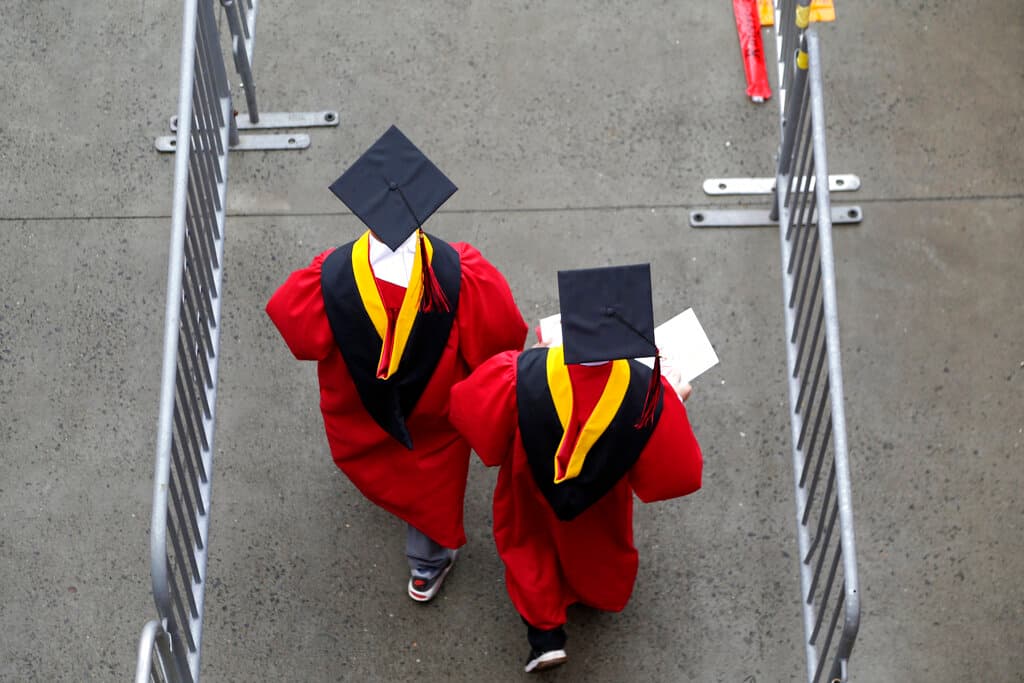Is the American Bachelor’s Degree Losing Its Luster?
As college enrollment and the number of new graduates decline, states are now beginning to do away with college degree requirements for many jobs.

Is the sheen wearing off the American liberal arts degree? Plummeting enrollment at colleges and universities, and the increasing number of both government and private sector employers abandoning their college-degree requirements for new hires, suggest that it might be.
According to the National Student Clearinghouse Research Center, undergraduate enrollment fell in the fall of 2022, albeit more slowly than in recent years.
Enrollment for the fall term dropped by 1.1 percent, bringing the total two-year decline since 2020 to 4.2 percent. Although there was a significant decline in 18- to 20-year-olds enrolled, much of this decline was driven by older and part-time students.
A former press secretary for the Department of Education during the Trump administration, Angela Morabito, speculates that this decline and the ensuing abandonment of degree requirements is due to the colleges themselves.
“Colleges are making themselves irrelevant,” Ms. Morabito said in a tweet. “I talk to people ALL the time who needed a college education to *get* their job but not to actually *do* their job.”
As college enrollment and the number of new graduates decline, states are now beginning to do away with college degree requirements for many jobs.
Pennsylvania has become the latest state to do so, with Governor Shapiro signing an executive order Wednesday that does away with the four-year degree requirements for 92 percent of state jobs.
“I want to make it clear to all Pennsylvanians, whether they went to college or they gained experience through work, job training, or an apprenticeship program: we value your skills and talents, and we want you to apply for a job with the Commonwealth,” Mr. Shapiro said in a speech Wednesday.
Pennsylvania, under the leadership of Mr. Shapiro, a Democrat, joins Utah and Maryland in dropping the requirement for a four-year degree for most government jobs.
In December, Governor Cox of Utah, a Republican, announced that the state would be dropping a college degree requirement for 98 percent of the jobs in the state’s executive branch.
“Degrees have become a blanketed barrier-to-entry in too many jobs,” Mr. Cox said. “Instead of focusing on demonstrated competence, the focus too often has been on a piece of paper. We are changing that.”
Maryland was the state that started the trend, with Governor Hogan’s “no skilled worker left behind” program. The program drops degree requirements for job seekers 25 and older who have a high school diploma or equivalent and are able to show they have gained skills through alternative routes.
These “Skilled Through Alternative Routes” job seekers might use community college education, apprenticeship, military service, skill bootcamps, and on-the-job training to waive the degree requirement.
These programs have also garnered support from the White House, with President Biden last spring calling on employers to focus on the skills of job applicants instead of their degrees.
With a tight labor market, companies including Google, Microsoft, Apple, IBM, Bank of America, and General Motors have dropped degree requirements for certain roles in an effort to gain an advantage in attracting talent.
A recent study by a employment analytics firm, Remote, has also recently found that the salaries in comparable roles are relatively unaffected by an employee’s degree or lack thereof.
Remote’s CEO, Job van der Voort, says that companies should focus more on a potential employee’s “experiences, teachability, adaptability, and resilience.”
“Rather than using a candidate’s level of formal education as the sole indicator of how they will perform in a position, we instead suggest removing degree requirements wherever possible,” Mr. van der Voort said.

